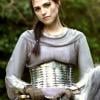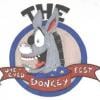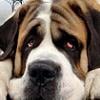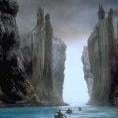
Wastrel
Banned-
Posts
405 -
Joined
-
Last visited
Contact Methods
-
Website URL
http://vacuouswastrel.wordpress.com
-
ICQ
0
Profile Information
-
Gender
Male
-
Location
London
Recent Profile Visitors
Wastrel's Achievements

Landed Knight (6/8)
-
How would voting in tiers equate to results in tiers? In STV, for instance, people give first, second and so forth preferences - but they don't elect a "first choice MP", "second choice MP" and so forth. All the people elected are equal... I could make a rough tiering, but I don't see the point. Remember, the more detail you want, the more arbitrary that detail is. For instance, I'm happy with my system of point allocation when it comes to selecting a list of books, but I'd be less happy with it if it came to any sort of ranking or tiering - and small changes in it could produce large changes in outcome. Is Orwell 7th - or 26th? Is Bulgakov 42nd - or 98th? It all depends on the details of the scoring system. And, again, do I tier the books or the authors? Tiering the books, when I've said that all votes for an author count for them, is rather cheating the voters who ahve taken me at that word and voted for a lesser-known book by a top author. This isn't all the books that were listed. There were something like 650 of those, and there's only about 1/6th of them here. And if it looks like an overview of what was voted for the most... well, that tends to be how elections work, yes. I can't wave a magic wand and pluck out some fascinating discovery that goes beyond the votes. That said, I'll think about how feasible/honest a tiering could be, given the discontent. Also, if people have specific questions about how authors did, I don't mind answering those. I've already given you the top ten - and as you go down the list, the difference between the different authors get smaller and less meaningful. EDIT: Also, you seem to suggest that this is only how often they've been listed - whereas in fact, as the methodology explains, it also matters HOW they are listed - top-tier votes carry more weight than bottom-tier votes.
-
Short answer no with an if, long answer yes with a but. I could, but there would be some issues with it. First, the books have got to the list in various ways (first slots, variously qualified additional slots, passed-on slots, and placement on the Greats List). Second, the votes were aggregated by author. So what's the ranking going to be based on? Total votes for that author? Total votes for that book? Total votes for the most popular book by that author? Is there a bonus for Greats votes? Is there a penalty for being the second or third listed book by a given author? I could answer these questions, but the answers would be arbitrary - all electoral systems are arbitrary, and this would just be yet another level of arbitration. But, more importantly, I won't do that, because that contravenes the purpose of the list as I see it. I repeat again: this isn't a list of the 101 best books ever, in order. It didn't set out to be that. It's merely an attempt, perhaps, at the best list of 101 books. A popular poll like this one simply CANNOT produce a ranked list of the greatest books, because of the massive disparities between what different voters have read (if voters are not ranking the same candidates, their rankings are not commensurable). For that, you need to look at the unified voice of an expert, or at most the aggregate voices of a group of experts (an interesting project for another time). This sort of popular vote cannot even find "the most popular" candidate, because it cannot distinguish between a book not being voted for because it is disliked, a book not being voted for because it is not known, and a book not being voted for because it is liked but ranked outside that voter's top twenty. Not to mention the fact that there is no such thing as "the" most popular - different electoral systems will give you different answers. If you DID really want a ranked list of the most popular books, the basis of such a poll would have to be getting people to share their opinion on every single book in an exhaustive list of books - it's the only way to avoid the ambiguities mentioned above. The mechanics would be very arbitrary, of course, but such a project would be feasible. However, even if that had interested me, it wouldn't have been possible in this case - because I didn't HAVE an exhaustive list of candidate books, and because the number of voters would certainly have been smaller if there was a compulsory 600-book ballot sheet, and also because the amount of work would have been immense. Feel free to try! --- So, I can't give you a meaningful ranked list. No poll of this sort possibly can. I could give you a ranked list anyway, and it would still be interesting for some purposes, but it wouldn't really be a ranking OF anything. In light of this, I think the only responsible thing to do is to refuse to give something that the methodology cannot support. That said, obviously Martin and Tolkien were in a level of their own. Tolkien narrowly but comfortably beat Martin, and The Lord of the Rings beat The Silmarillion, but A Song of Ice and Fire beat both (but didn't beat their combined total). R. Scott Bakker and Gene Wolfe formed a second tier by themselves. Herbert, Mieville, Kay, Simmons and Orwell then followed in their own tier, with Card rounding out the top ten. That's by "points" (which take into account which tier they were in on the ballot). In terms of overall how-often-were-they-mentioned votes, the top ten were Tolkien, Martin, Mieville, Wolfe, Bakker, Herbert, Abercrombie, Kay, Gaiman and Hobb.
-
I won't bore you with the details of the mythology, but to say that all elections should be considered in the context of their electoral systems, and their electoral systems should be considered in the context of their objectives and constraints. To that end, if anybody wants to read about what the poll tried to achieve, how it tried to achieve it, and what that meant it was unable to achieve, I've explained the methodology, and answered some potential questions about it, on my blog, with the posts indexed HERE. Headline Summary: this list should not be read as a pure "best of" list - a popular vote can't achieve that. There are books on the list that aren't that good, and books that are very good. But every book on the list is likely to be worth reading... for some or other reader; and every reader (at least, every reader interested in the genre) should find something here they find worth reading. It's not a statement of what the board can completely AGREE is worth listing (that would be a very short list); it seeks to compromise between consensus agreement and an eclectic expression of as many tastes as possible. Perhaps it should be seen as a statement: "this is what we like" - and that doesn't entail that we all like all of it.
-
Ten Works from the 21st Century: Acts of Caine – Matthew Stover Black Man – Richard Morgan The First Law Trilogy – Joe Abercrombie The Lies of Locke Lamora – Scott Lynch The Long Price Quartet – Daniel Abraham The Malazan Book of the Fallen – Steven Erikson The Orphan’s Tales – Cathrynne M. Valente Prince of Nothing – R. Scott Bakker The Scar – China Mièville Stories of Your Life and Others – Ted Chiang Honourable Mentions: The Road (Cormac McCarthy), American Gods (Neil Gaiman), City of Saints and Madmen (Jeff Vandermeer), Cloud Atlas (David Mitchell), Jonathan Strange and Mr Norrell (Susanna Clarke), The Wizard Knight (Gene Wolfe), Chasm City (Alastair Reynolds), Anathem (Neal Stephenson).
-
Mod note: In order to keep the top of Literature clean, here are the links all in one place. Please direct your recommendations (no discussion) to one of these threads. Looking for a book to read? Look no further. Fantasy and Science Fiction Series Fantasy and Science Fiction Standalone Books Fantasy and Science Fiction Obscure Works Non-Modern Fantastical Literature Other literature (literary fiction, non-fic, etc.) Below are posts from the thread "Westeros Fantasy and Science Fiction Book List". This was a poll done in 2010 of posters in this forum and a list compiled from there. It is unranked, but straddles many people's recommendation lists. -Kat Original post below: ------------------------ I've already posted this over in the original thread, but perhaps a new thread/post for stickying would be appropriate. ----------------- The Main List: The Affirmation – Christopher Priest The Amazing Adventures of Kavalier and Clay – Michael Chabon The Anubis Gates – Tim Powers The Autumn of the Patriarch – Gabriel Garcia Marquez The Black Company – Glen Cooke Blindness – Jose Saramago The Book of the New Sun – Gene Wolfe Brave New World – Aldous Huxley A Canticle for Leibowitz – Walter M. Miller, Jr. Cat's Cradle – Kurt Vonnegut Childhood's End – Arthur C. Clarke China Mountain Zhang – Maureen McHugh The Chronicles of Amber – Roger Zelazny The Chronicles of Narnia – C.S. Lewis The Chronicles of Thomas Covenant (The Chronicles of Thomas Covenant the Unbeliever, The Second Chronicles of Thomas Covenant, and The Last Chronicles of Thomas Covenant) – Stephen Donaldson A Clockwork Orange – Anthony Burgess The H.P. Lovecraft Omnibus – H.P. Lovecraft The Dark Tower – Stephen King Discworld – Terry Pratchett* [see Note] The Dispossessed – Ursula K. Le Guin Do Androids Dream of Electric Sheep? – Philip K. Dick Doomsday Book – Connie Willis Downbelow Station – C.J. Cherryh Dracula – Bram Stoker Dune – Frank Herbert The Dying Earth – Jack Vance The Dying of the Light – George R.R. Martin The Earthsea Trilogy – Ursula K. Le Guin The Empire Trilogy – Raymond E. Feist and Janny Wurts Ender's Quartet – Orson Scott Card The Farseer Trilogy – Robin Hobb The Fencer Trilogy – K.J. Parker Fevre Dream – George R.R. Martin Fictions – Jorge Luis Borges The Forever War – Joe Haldeman The Foundation Trilogy – Isaac Asimov The Gap Series – Stephen Donaldson Good Omens – Terry Pratchett and Neil Gaiman The Gormenghast Trilogy – Mervyn Peake The Gospel According to Jesus Christ - Jose Saramago A Handmaid's Tale – Margaret Atwood The Harry Potter Series – J.K. Rowling Hellblazer – Garth Ennis His Dark Materials – Philip Pullman The Hitch-Hiker's Guide to the Galaxy: A Trilogy in Five Parts – Douglas Adams The Hobbit – J.R.R. Tolkien Hyperion – Dan Simmons I Am Legend – Richard Matheson The Illiad - Homer Invisible Cities – Italo Calvino The Iron Dragon's Daughter – Michael Swanwick The Last Unicorn – Peter S. Beagle The Left Hand of Darkness – Ursula K. Le Guin The Lions of Al-Rassan – Guy Gavriel Kay Little, Big – John Crowley The Liveship Traders – Robin Hobb Lord of Light – Roger Zelazny The Lord of the Rings – J.R.R. Tolkien Lucifer's Hammer – David Niven and Jerry Pournelle The Lyonesse Trilogy– Jack Vance The Glass Bead Game – Hermann Hesse The Man in the High Castle – Philip K. Dick The Master and Margarita – Mikhail Bulgakov Memory, Sorrow and Thorn – Tad Williams Midnight's Children – Salman Rushdie The Moon is a Harsh Mistress – Robert A. Heinlein Le Morte D'Arthur – Thomas Mallory Mythago Wood – Robert Holdstock Neuromancer – William Gibson The Night’s Dawn Trilogy – Peter F. Hamilton Nineteen Eighty-Four – George Orwell Odyssey - Homer One Hundred Years of Solitude – Gabriel Garcia Marquez Only Forward – Michael Marshall Smith Otherland – Tad Williams Permutation City – Greg Egan Planet of Adventure – Jack Vance The Prestige – Christopher Priest Replay – Ken Grimwood The Riddle-Master Trilogy – Patricia A. McKillip Sandman – Neil Gaiman The Sarantine Mosaic – Guy Gavriel Kay Shardik – Richard Adams The Silmarillion – J.R.R. Tolkien Slaughterhouse 5 – Kurt Vonnegut Snow Crash – Neal Stephenson Solaris – Stanislaw Lem The Soldier Trilogy (Soldier of the Mist, Soldier of Arete, and Soldier of Sidon)– Gene Wolfe A Song of Ice and Fire – George R.R. Martin The Stand – Stephen King The Stars My Destination – Alfred Bester Starship Troopers – Robert A. Heinlein Tigana – Guy Gavriel Kay The Tooth Fairy – Graham Joyce Transmetropolitan – Warren Ellis Use of Weapons – Iain M. Banks The Warlord Trilogy – Bernard Cornwell Watchmen – Alan Moore Watership Down – Richard Adams We – Yevgeny Zamyatin The Wheel of Time – Robert Jordan Honourable Mentions: Salem’s Lot (Stephen King), Till We Have Faces (C.S. Lewis), The Once and Future King (T.H. White), The Elric Series (Michael Moorcock), A Fire Upon The Deep (Vernor Vinge), Fahrenheit 451 (Ray Bradbury), The Vorkosigan Saga (Lois McMaster Bujold), The Little Prince (Antoine de Saint-Exupéry), Gravity’s Rainbow (Thomas Pynchon), and The Divine Comedy (Dante Alighieri). *Nota Bene: The Discworld series is extremely long, and variable in style and quality, with litte connexion between many of the novels, and so would probably have better been considered as separate novels. However, the voting was overwhelmingly for it as a series. Furthermore, the most popular individual Discworld book, Night Watch, is generally considered one of the least independent books, and one of the least appropriate for beginners. The second-most mentioned book, Small Gods, is a standalone novel with few connexions to any other novels in the series, and is therefore probably a better starting point for newcomers; however, I didn’t feel it would be legitimate to promote it over Night Watch in this vote (it is not my place to make these decisions), and so rather than list the less accessible book, I acquiesced to the popular voting pattern and listed the entire series, with the addition of this explanatory note.
-
 Merrett Frey's Sponsor reacted to a post in a topic:
Vote on the Reputation System
Merrett Frey's Sponsor reacted to a post in a topic:
Vote on the Reputation System
-
 Dreadwolf reacted to a post in a topic:
Vote on the Reputation System
Dreadwolf reacted to a post in a topic:
Vote on the Reputation System
-
I' sorry, I don't understand what you're saying, or how this post relates to mine. Could you be clearer?
-
ANYTHING "can be perceived as an attack". That doesn't mean that it is IS, or that it should be treated as such. Offence is not harm. As somebody whose ego and feelings have been bruised and hurt on this board before: bruised egos are not always a bad thing, and are certainly not always a reason to stop doing whatever's doing the bruising. The merest offence caused to the singulist member should not be cause to change the behaviour available to everybody on the forum - sometimes, some people should just learn to be less offended, and if that means that the board loses certain people (such as myself) that may be bad for both the board and the poster in the short run, but in the long run is likely to be better for both of them than an overly-sheltered environment. Of course special considerations should be made in extreme cases - and of course, likewise, if so many of the board would leave over a trivial issue that it seriously affects the board, the board must accomodating their hypsersensitivity, irrational as it may be. But I don't see that either are the case here. I also don't think that that "it hurts some people and isn't a great gain for anybody" line of thought should be followed through - because if we do that, we, as a society, would loe almost everything, reverting to a neutrality of harmlessness that serves nobody. Of almost anything, it's true that the harm to some is far greater than the good to any - the harm of legalised alcohol to some alcoholics, for instance, is far greater than the good to any individual person in need of a beer. *watches reputation drop further*
-
 Arbor Gold reacted to a post in a topic:
Vote on the Reputation System
Arbor Gold reacted to a post in a topic:
Vote on the Reputation System
-
Personally, as my entire interaction with the board has consisted of either a) me saying something and being totally ignored, and B) me saying something and being aggressively shouted down, I'm pleasantly surprised to discover that I've somehow managed to accumulate a +15 reputation. Don't know how good that is, but hey, it's positive, which was unexpected. Of course, now that I've said this, my reputation will be hacked up by vengeful bitter (and/or ironic) people, but still, for the moment of pleasant surprise, I vote to keep it. After all, there are five sorts of people here: - people who think they're unpopular but actually they aren't - people who think they're unpopular and actually they are - people who think they're popular but they aren't - people who think they're popular and they are - people who think nobody has an opinion about them, or that they are perfectly divisive, and who end up with ~0 reputation The first lot benefit from this system by the boost to their egos. The second lot lose nothing - they just get told what they already know. The third lot have their egos damaged and get upset - but since this corrects a delusion that is unhelpful to both them and the board, this is a good thing in the long run The fourth lot, again, just get told what they know. The fifth lot don't get told anything - which isn't good, but leaves them no worse off than they were before. EDIT: making it positive-only is the same as getting rid of it, as it makes it impossible to distinguish 'positive' from 'prominent' (and 'negative' from 'overlooked). Making it non-anonymous is the same as making it positive-only - because you can't vote people down if they can see you doing it (or you can, but it's likely to create a great deal of unpleasantness, bitterness and vendetta, so it's not a good idea).




